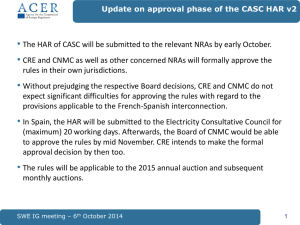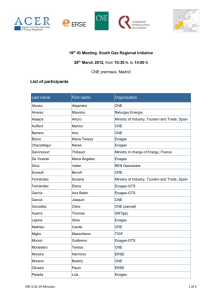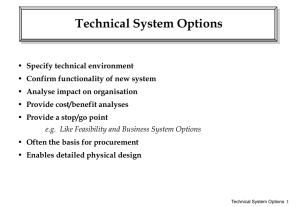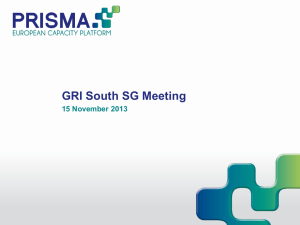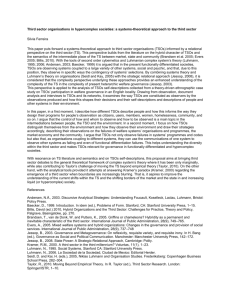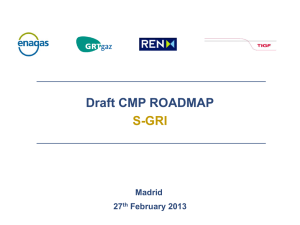20th SG SGRI meeting - Draft minutes - ACER
advertisement
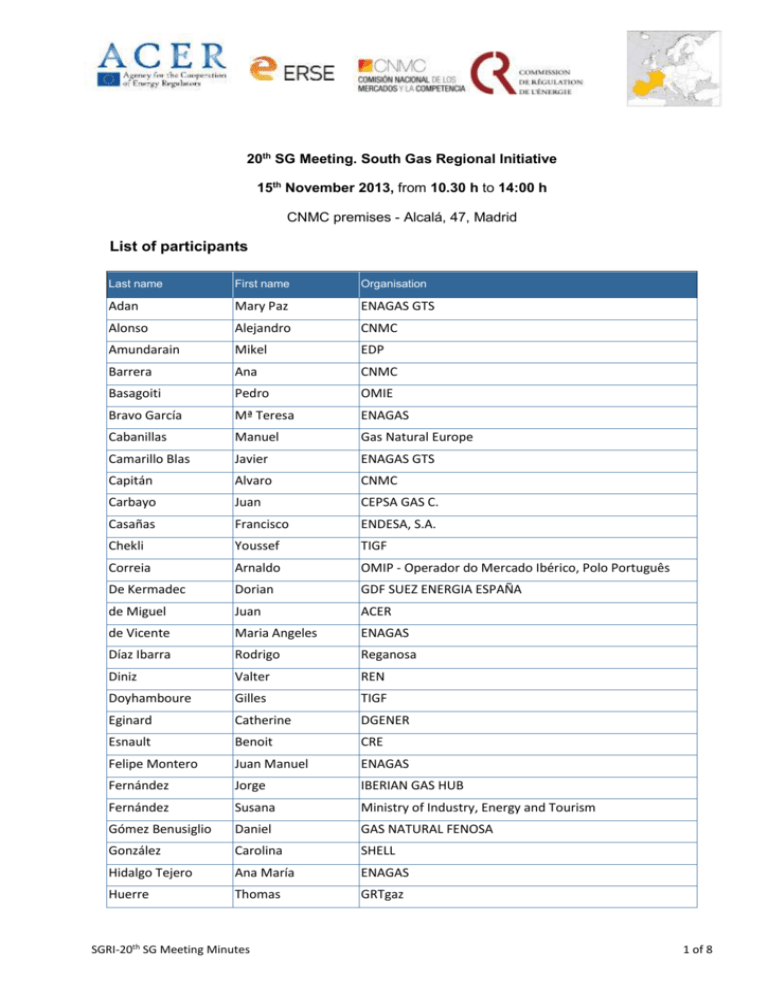
20th SG Meeting. South Gas Regional Initiative 15th November 2013, from 10.30 h to 14:00 h CNMC premises - Alcalá, 47, Madrid List of participants Last name First name Organisation Adan Mary Paz ENAGAS GTS Alonso Alejandro CNMC Amundarain Mikel EDP Barrera Ana CNMC Basagoiti Pedro OMIE Bravo García Mª Teresa ENAGAS Cabanillas Manuel Gas Natural Europe Camarillo Blas Javier ENAGAS GTS Capitán Alvaro CNMC Carbayo Juan CEPSA GAS C. Casañas Francisco ENDESA, S.A. Chekli Youssef TIGF Correia Arnaldo OMIP - Operador do Mercado Ibérico, Polo Português De Kermadec Dorian GDF SUEZ ENERGIA ESPAÑA de Miguel Juan ACER de Vicente Maria Angeles ENAGAS Díaz Ibarra Rodrigo Reganosa Diniz Valter REN Doyhamboure Gilles TIGF Eginard Catherine DGENER Esnault Benoit CRE Felipe Montero Juan Manuel ENAGAS Fernández Jorge IBERIAN GAS HUB Fernández Susana Ministry of Industry, Energy and Tourism Gómez Benusiglio Daniel GAS NATURAL FENOSA González Carolina SHELL Hidalgo Tejero Ana María ENAGAS Huerre Thomas GRTgaz SGRI-20th SG Meeting Minutes 1 of 8 Last name First name Organisation Jiménez Carmen UNION FENOSA GAS Lopera Palacios Montserrat Gas Natural Comercializadora, S.A. Lucio Jorge Galp Energia Ludena Cristina RWE Mangas Rodrigo GDF SUEZ Energía España Martín Muñoz Ignacio GAS NATURAL FENOSA Martínez Adolfo Capital Energy Read Martínez Jorge UNION FENOSA GAS Mathieu Carole CRE Miras Pedro ENAGAS Moncó Guillermo ENAGAS Monedero Teresa CNMC Monteiro Gonçalo Galp Gás Natural M'rabet Adil RWE Notario Javier CNMC Páez Mª José IBERDROLA Parada Luis Ignacio ENAGAS Pastor Pablo UNION FENOSA GAS Peña Javier GALP ENERGIA Pérez Cuevas Juan Antonio SEDIGAS Poblaciones Corencia Prieto Rosalia GAS NATURAL FENOSA Rocío CNMC Priller Dominikus RWE Ramos Roberto Enérgya VM Gestión de Energía SL Ranea Jose Antonio Endesa Energía S.A.U. Rodríguez Rubio Angel ENAGAS Romero Fátima ENAGAS Rubio Sofía GAS NATURAL FENOSA Serrano Adolfo UNION FENOSA GAS Sierra Eusebio EON Sitja Salvatella Josep ENDESA, S.A. Tordjman Florence Vagaggini Italo Ministère de l'écologie du développement durable et de l'énergie GRTgaz Velázquez Amaya CNMC Verdelho Pedro ERSE - Portugal SGRI-20th SG Meeting Minutes 2 of 8 Last name First name Organisation Vozmediano Carmen IBERDROLA Yunta Raúl CNMC All documents presented in this meeting are available on ACER webpage: http://www.acer.europa.eu/Gas/Regional_%20Intiatives/South_GRI/20th%20South%20SG/default.aspx I. I.1 Opening Welcome The Chair welcomed all participants and expressed his pleasure to host this twentieth Stakeholders Group (SG) meeting. I.2 Approval of the agenda and minutes from the last meeting The agenda and minutes from the last meeting were approved with no changes. II. CAM harmonization II.1. Results of the last auction between Portugal and Spain TSOs presented the results of the auction to allocate capacity for the period October 2013September 2014, at the Virtual Interconnection Point between Spain and Portugal. The amount of capacity offered to the market in the Spain-Portugal direction was 45 GWh/d as firm yearly product, 20 GWh/d as interruptible yearly product and 10 GWh/d as interruptible quarterly product for Q4 (1 Jul - 30 Sept 2014). In the Portugal-Spain direction, 60 GWh/d was offered as firm yearly product and 35 GWh/d as interruptible quarterly product for Q4-2014. The auction process included the prequalification phase (3rd -12th June), the annual yearly capacity auction (13th June – 2nd July), the annual quarterly capacity auction (3rd – 19th July and the interruptible capacity auction, only if total firm capacity was previously allocated (22nd – 25th July). 5 shippers were prequalified and only 1 participated in yearly capacity auctions. 1 GWh/d was allocated in Spain-Portugal direction. There were no participants in quarterly auctions and no interruptible capacity auctions were started. II.2. Status of CAM Roadmap in SGRI. Latest agreements on the CAM for 2014. Regulators presented the Paper agreed in the last IG meeting, to progress on CAM NC early implementation. The Paper presents the Regulators analysis of relevant topics in order to progress on the early implementation of CAM NC. Until full implementation of CAM NC in November 2015, auctions to allocate capacity products will take place in March 2014 (annual yearly products auction), June 2014 (annual quarterly products auction) and September 2014 (monthly capacity products SGRI-20th SG Meeting Minutes 3 of 8 auctions). Therefore, applicable issues have been agreed and they will be taken into account by TSOs and stakeholders in the South Region to move forward with the code’s implementation. It includes agreements on the capacity allocation process, such as: split of the capacity to be offered, interruptible capacity, registration for participating in the auctions, financial guarantees, prices, contracts, capacity transfer, monitoring, stakeholders’ information, interim period and secondary market. Also, interoperability aspects have been analyzed (gas day, combustion reference temperature, data exchange and nomination/renomination schemes) to help CAM NC implementation and facilitate users’ and TSOs’ daily operation. Finally, the Paper analyses the regulatory development required in the three countries to implement the CAM NC. II.3. Update information on PRISMA: shippers requirements and IT implementation in the SGRI TSOs presented the tasks performed in order to allow the auction process. They were presented separately at both borders: ENAGAS and TIGF for ES-FR border and ENAGAS – REN for ES-PT border. TSOs informed on the requirements to participate in the auctions via PRISMA: how to register in PRISMA, to get a valid Energy Identification Code (EIC) and to allocate the capacity The shipper with the EIC has to get licenses in both countries at two sides of the border. The license procedure is established by the competent authority in each country: MINETUR in Spain, DGEC in France (from the Ministry of France was announced that the process to get a license takes around two months, therefore, interested shippers were encouraged to register as soon as possible) and DGEG in Portugal (no more than 30 days to register). The same shipper will sign the standard contracts with the two TSOs before participating in the auction and will sign the annex of each contract when allocating capacity. On the French side, signature of a new contract is not necessary for shippers already having an active transport contract with TIGF. PRISMA’ representative presented the reached significant acceptance of the use of the European Capacity Platform: 297 shippers with more than 900 users and more than 28,000 auctions have taken place since the platform started. PRISMA held a public consultation on the platform functionalities and new GT&Cs. The PC ended on 16 September 2013 and an evaluation is currently being prepared. The big difference between offered and allocated capacity remarks the lack of interest in the market, possibly because there is no congestion at IPs. Also, TSOs pointed out that several WS training for shippers to use PRISMA will take place in the Region in the coming months. Some aspects were discussed, such as (1) different interruptibility conditions in both sides of the border which prevents the possibility for bundling the interruptible capacity (but it is also not a requirement of the CAM NC); (2) the high costs for organising the daily and intraday capacity auctions considering the necessary IT developments ; (3) different procedures to allocate day ahead capacity at the two borders and even –in the interim period - at two sides of the same border (FCFS at both sides of the ES-PT border and auction process in French side as of September 2014 and FCFS in Spanish side of the ES-FR border) and (4) the contracts in the VIP. The Portuguese regulator expressed concerns regarding the costs of participating on the PRISMA platform, namely regarding the organization of daily and intraday capacity auctions. The actual split SGRI-20th SG Meeting Minutes 4 of 8 of costs of the PRISMA platform among TSOs does not reflect the costs incurred by each TSO representing a barrier for the participation of small demand countries in this process. II.4. Allocation of capacity in Portugal under the new regulation ERSE presented the changes in National regulation, to take into account the new developments on tariffs and enable the implementation of secondary market. Five new changes were highlighted: (1) assignment of capacity rights by the TSO for MT and ST products, (2) Convergence towards CAM NC rules, (3) Ex-ante payment of capacity rights: shippers pay according to allocated capacity, (4) Capacity allocation via booking platform in the primary market which improves the interaction between primary and secondary market, while enabling daily auctions and (5) Promotion of the secondary market for capacity rights trading enhancing liquidity and avoiding contractual congestion. ERSE encourages stakeholders to send feedback and learn with the process. II.5 Next steps and calendar The following issues have been agreed regarding CAM: The presentations and documents that will be dealt in the SG meeting must be sent in advance in order to be shared with all members. The Regulators’ Paper to progress on early implementation of CAM NC will be submitted to Public Consultation for fifteen days (until 4th December on ACER website). NRAs and TSOs encourage shippers to participate in WS on PRISMA training that are planned in cooperation with TSOs in the Region, expected in the next months. NRAs request participants to comply with the calendar established in CAM Roadmap in the Region. Gas Natural Fenosa proposed to include a new point in the next Agenda of SG meeting, noting that they have difficulties with gas flow in the French South area of the Spanish-French border. This shipper and IBERDROLA complained about gas flow interruption from TIGF maintenance works and the maintenance program being rescheduled without due notice in advance. TIGF explained that the availability of capacity was high (98% in 2013) despite of the works that have been undertaken to increase the cross-border capacities. TIGF offered to schedule bilateral meetings with the two shippers, in order to better understand their concerns and further discuss the issue. The French Regulator explained that the interruption rates and the reliability of the maintenance programmes are being closely followed, as part of the yearly monitoring on quality of service in particular. III. CMP SGRI-20th SG Meeting Minutes 5 of 8 III.1. Status of CMP Implementation in the SGRI: Portugal, France and Spain Regulators explained the status of implementation in their countries, compulsory as from 1 October: CRE: Deliberation was published in the end of June. CNMC is finalizing the approval process by the Board. ERSE, REN and stakeholders are working in cooperation on surrender capacity mechanism development. In Portuguese side the LT UIOLI implementation is delayed because no long term capacity rights were attributed to shippers. The capacity products being offered to the market through auctions in line with the NC have a maximum duration of 1 year. Portuguese regulator considers that the main concern now was to implement CAM NC to allocate primary capacity. As this process is concluded they are going to follow the same CMP rules that will be established by neighbouring countries. The three mechanisms surrender capacity, oversubscription and buy-back and LT UIOLI are similar at both sides of the FR-ES borders. Main differences are related to the involvement of NRA in the implementation of LT UIOLI, where CNMC proposes an automatic process performed by TSOs, and CRE has an important involvement in the final withdrawal decision. Coordination between adjacent TSOs is required in all mechanisms, in particular in OSBB to define the methodology to determine the additional capacity to be offered, bundle the capacity and coordinate the buyback procedure. ACER informed that two reports are being elaborated in relation to CMP: Monitoring Report on congestions at IPs with respect to firm capacity products sold in precedent year, by 1 March 2014 (according to Guidelines on CMP). Status of the implementation of CMPs rules in European countries, mandatory from 31st October 2013. A questionnaire tool online is being designed jointly by ACER and ENTSOG to be answered by regulators and TSOs. IV. Iberian Gas Hub: study on models for integration of the Spanish and Portuguese gas markets. Regulators informed on the status of the Study which analyzes different aspects of the current gas market situation in Spain and Portugal, including prices in the gas market. The study covers three different models of market integration (market area model, trading region model and market with implicit capacity allocation) and its potential applications to the Iberian gas market, assessing the advantages and disadvantages of each model. The Draft Study is pending on approval by CNMC and ERSE (expected by 2013 - Q4). Next steps are: the document will be submitted to Public Consultation in both countries in the first quarter of 2014 and the stakeholders’ responses will be analysed (2014 - Q2). Finally, the document will be approved by Regulators in 2014 - Q2. V. Infrastructures V.1 Update on 2013 South Gas Regional Investment Plan (GRIP) SGRI-20th SG Meeting Minutes 6 of 8 TSOs presented the progress on the South GRIP 2011-2020. The methodology is in line with ENTSOG TYNDP 2013-2022, focused in the regional level and complementing it, also made consistent with National Plans. The elaboration process takes into account the ACER Opinion (25th March 2013), the updated information included in TYNDP, the first list of PCIs, FID, non FID projects and more harmonization at European level (with ENTSOG assistance). Furthermore, they highlighted a more comprehensive approach on the system needs and the analysis of demand in 2011 and forecast for the next years. The Draft document will be submitted to Public Consultation in ENTSOG WS on 26th November 2013. Later, it will be sent to regulators for comments. The Draft GRIP will be ready at the beginning of December and last results/verifications and feedbacks will be included before its publication in January/February 2014. V.2 Latest news on PCIs EC informed that the first list of PCIs was adopted by the Commission on the 14th October. Ten projects affect to the South Region. The projects may benefit from an accelerated permit granting (3.5 years time limit and one-stop shop), an improved regulatory treatment for cross-border projects (cross-border cost allocation - CBCA, appropriate incentives) and rules to grant financial aid under the Connecting Europe Facility. Regulators also announced their participation in European Working Groups in relation to infrastructures. Two documents were recently approved regarding CBCA: ACER Recommendation (September 2013) which includes information to be submitted with a CBCA request. Secondly, ACER Internal document (November 2013) which contains steps, timeline and ways of coordination between NRAs as to how to implement the provisions. Furthermore, works on energy system-wide cost-benefit analysis and long-term incentives for investment are currently ongoing by EC, ACER, NRAs and ENTSOG. VI. LNG market changes and cross-border flows in the SGRI TSOs presented the LNG flows in each area: North France - South France flows: LNG supply decreases 38% in 2012-2011. France - Spain cross-border: all firm marketable capacities (France Spain) have been subscribed; the rate of use is around 70% in 2008-2012, strong increase of rate of use for the last 3 years (50% in 2010, around 100 % in 2012). Spain: LNG and third country flows: the rate of use in all six Spanish LNG terminals decreases in 2008-2012; the rate of subscription in the IPs has increased in 2011-2012. Portugal: LNG and cross-border flows: cross-border imports to the Portuguese gas system for the last 5 years show a slight increase as LNG flows are dropping in the same period. CNMC underlined the high price of NG in Spanish national system probably caused by the LNG supplies. Traders in the Region explained that LNG cargoes are diverted to Asia, attracted by higher prices, and this situation seems not to change in the next 6 months. VII. AOB and next meetings SGRI-20th SG Meeting Minutes 7 of 8 Next meetings: 25th IG meeting via videoconference: in the week starting on the 9th of December; the specific date will be agreed by email. 21st SG meeting: in February; not specific day was scheduled. SGRI-20th SG Meeting Minutes 8 of 8
